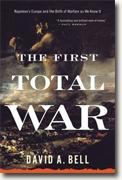The First Total War
David A. Bell
book reviews:
· general fiction
· chick lit/romance
· sci-fi/fantasy
· graphic novels
· nonfiction
· audio books
· author interviews
· children's books @
curledupkids.com
· DVD reviews @
curledupdvd.com
newsletter
win books
buy online
links
home
for authors
& publishers
for reviewers

 |
The First Total War: Napoleon's Europe and the Birth of Warfare as We Know It David A. Bell Mariner Paperback 432 pages January 2008 |
|
The two world wars of the 20th century were horrible things, full of atrocities, mass death and carnage, with massive civilian casualties to go along with the military ones. The scale of the destruction was unprecedented: in these conflicts, no holds were barred, no quarter given, and if you were in the war zone, you were never safe. Massive military machines continued to thrust at each other, often futilely (especially during the first war). Warfare was drastically different from the relatively quaint wars fought in the 18th century and before, where there seemed to be more rules and less bloodlust.
Bell does a marvellous job of showcasing and contrasting what the military was like before and after this change, giving examples of noblemen for whom being an officer was just one of their many facets. Especially funny is the image of foppish officers with their powdered wigs, the powder spraying backward as they run forward into battle, or the officers with entourages and baggage trains larger than many supply caravans. When Bell moves on into the realm of total war and a militarized society, we see the vast differences involved. Bell examines the changes in the "culture of war" and how this transformed society as a whole. "Civilian" wasn't even a separate term from "soldier" up until the Revolution, as the view of the military was again just one aspect of a man's social life. This gave rise to a specifically military culture that did not exist before this time period. The word "militarism" didn't even exist until this change occurred, and it resulted in an imposition of military values on the civilian culture. Soldiers were now revered rather than spat upon, seen as heroes instead of scum. In Bell's examination of the total war phenomenon, he also gives a fairly detailed history of the Napoleonic wars as well as the rise of Napoleon during the late 1790s, demonstrating how Napoleon used the new militarism to enhance his own reputation and bring himself even more power. While every major Napoleonic battle is recounted to some extent, Bell saves most of the detail for the various insurgencies and rebellions that Napoleon and his generals had to put down, mainly because the methods and tactics involved are what "total war" is all about. Bell goes into great detail about the atrocities committed by soldiers trying to stifle the rebellions that were popping up, as well as some of the horrible things the rebels did (he sometimes likens them to organized-crime figures rather than soldiers, as they often kept their own populace hostage to their rebellion). The roots of this are embedded in the Revolution and the attempts to put down various rebellions in the French provinces, especially the Vendee. For the first time, war was perpetrated on more than just an enemy army; women and children were also considered part of the rebellion and ruthlessly repressed. While the book is extremely interesting and well-researched, it's yet another book with the most annoying notation system I've ever seen. Instead of endnotes or footnotes, the notes pages have page numbers and then small excerpts (three or four words) from the page that indicate what the note is talking about. Since it's not obvious when you're reading what will be noted and what won't be, you're constantly flipping back to the notes page to see where the next one is going to be. Or you could be like me and just ignore them other than to scan them after the fact. I am a big fan of footnotes, and I wish more history books would make their notations that way, so everything is on the same page. The First Total War Originally published on Curled Up With A Good Book at www.curledup.com. © Dave Roy, 2008 |
|
|
|
 Click here to learn more about this month's sponsor! |
|
| fiction · sf/f · comic books · nonfiction · audio newsletter · free book contest · buy books online review index · links · · authors & publishers reviewers |
|
| site by ELBO Computing Resources, Inc. | |
 David A. Bell, a professor at Johns Hopkins University, suggests that the change in warfare began with the French Revolution and ultimately transformed into the kind of war we're familiar with during the rise and fall of Napoleon. In
David A. Bell, a professor at Johns Hopkins University, suggests that the change in warfare began with the French Revolution and ultimately transformed into the kind of war we're familiar with during the rise and fall of Napoleon. In